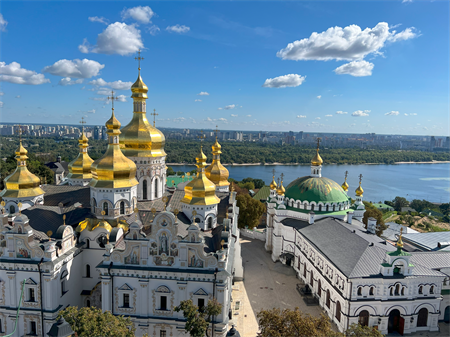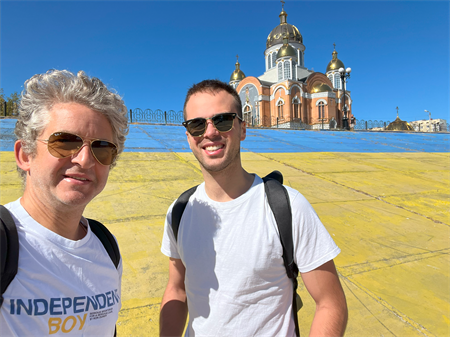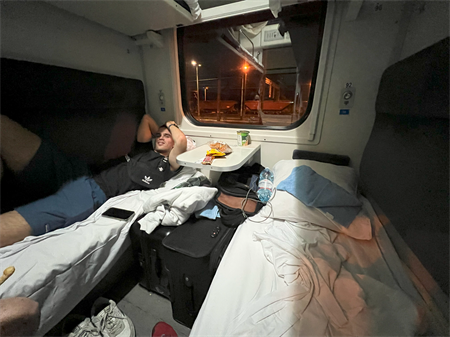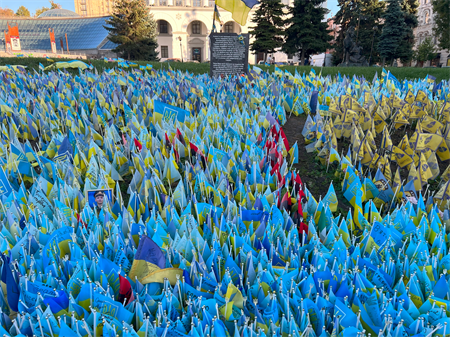A Personal Account of a Journey to Ukraine
When I approached my team leaders earlier this year about taking a few days off work to go to Ukraine, the reactions were mixed! The principal reason for going to Kyiv was to accompany and support Michael, a young friend in need; dodging missiles was not a reason.
My initial reaction when Michael made clear his intentions to travel to a country at war was also of incredulity. But then I thought, “Hey, what an adventure, I’ll go too!” Two sleepless nights later (due to both excitement and trepidation), my mind was made up — I began researching planes, trains, and buses to get to Eastern Europe, through a no-fly zone.

A few weeks later we were boarding a plane in Geneva, heading for Warsaw, Poland, via Zurich. From Warsaw we boarded a train to Chelm, a Polish frontier town. I was looking forward to a good meal and a glass of wine during the two and a half hours stop over. Arriving in Chelm, there was nothing but a “7-Eleven” style outlet and a supermarket, both overflowing with ultra-processed foods of little attraction and canned, sugar-filled liquids.
We ended up having a picnic on my suitcase, in the dark, on the station steps. I will spare you more details, suffice it to say that 27 hours, two trains, two passport checks and many hours of waiting later, we arrived in Kyiv on a warm, summer, blue skyed afternoon,completely oblivious to the fact that the train’s wheels had been “changed” and that the country was fighting for survival.
At first sight, the city was like any other European cosmopolitan hub, showcasing the café-terrace lifestyle (so common when the sun is out), and holidaymakers enjoying the tourist attractions. I checked into my hotel with no other tourists to be seen. With approximately 10% occupancy, the hotel guests were clearly military, consultants, NGO officials, journalists, reporters, humanitarian advisors, and the like. The grand ballroom, closed to the skies, made do as the hotel’s shelter.
What to do for six days and six nights in Kyiv? Michael busied himself with visiting aunts, uncles, and grandparents, checking in and out as required to the medical centre. And I? Real estate of course! Thanks to colleagues and friends, I had prepped my visit to Ukraine and had meetings scheduled with a valuer, a vice-dean, a professor, a real estate lawyer, a commercial property agent, a developer doubling up as the owner of a private real estate school, and a rock musician turned music video producer.


Sergey But is the managing partner of Pickard Real Estate Services. Given the lack of transactions in a country under attack, Sergey’s time is devoted to a Finnish charity, Sisu Ukraine. It seems that there is no direct translation for the Finnish word "sisu", but it means “a white-knuckled form of courage and unimaginable determination in the face of overwhelming odds.” A recent BBC News report informs us that one major hospital in the southeast of Ukraine, close to the frontline, has treated 20,000 people since February 2022, and that 2,000 of these were amputees. The reporter stated that 15,000 people have lost limbs in the war in the first six months of the year. The casualties keep coming. As Sisu Ukraine state, every contribution, no matter how small, makes a significant impact. Sergey But has sent me some photos of their frontline efforts, providing tourniquets and stretchers to those fighting. It will do little to help the mental trauma of a generation of soldiers.
Ігор Райков (“Igor”) is a property developer and owner of a private real estate school, “Urban Land.” The sign in the entrance says “CПIΛbHOTA” which translates as “community.” Igor spent the first year of the war on the frontline flying reconnaissance drones as a volunteer at the 13th Brigade of the National Guard of Ukraine. He is now back in the capital with his family. His school is educating young professionals in the development and construction sectors and will soon be turning to teach his students about how to reconstruct and regenerate the towns and villages destroyed by fighting. Igor was generous with his time, chauffeuring me around the city, visiting the latest business park “Unit City,” regenerated from a disbanded soviet motorcycle factory, and several city sights, including Saint Sophia Cathedral, built in the 11th century and a UNESCO World Heritage Site; Kiev Pechersk Lavra, a monastery complex located on the Dnieper River and home to a number of churches and catacombs; and Andriyivskyy Descent, an historic street lined with art galleries, souvenir shops, and restaurants.

It’s difficult to describe the atmosphere in the city. There’s a tension, a wariness, even a weariness — but also a strong sense of pride and bravery. The blue and yellow national flag adorns the buildings, the streets, and every pole. Even the security bollards in front of the British Embassy are painted in the Ukrainian colours.
Maiden Nezalezhnosti is a central square and the site of many important events in Ukrainian history, including the Orange Revolution and the Revolution of Dignity in 2014. There I witnessed a garden full of Ukrainian flags. A plaque has been erected, dominating the scene. It reads: “These flags each represent an innocent life stolen by a single madman Vladimir Putin. It was decided here in this sacred square that Ukraine wished to be free and independent, and no greedy tyrant can take that away (why is he still alive)…” The quote is provocative. There is not enough room to show all the flags that represent the people that have died.

One night during my stay, I was awoken at 1:15 a.m. to the sound of the critical Air Alert app’s warning alarm that stresses not to be complacent. There’s no snooze button and I must have almost immediately dropped off to sleep again until 3:08 a.m. when the same app gave the all-clear, “May the force be with you.” I had not made it to the hotel’s shelter. I’d heard nothing outside but woke to a call from my friend and travel buddy Michael who’d witnessed the explosions from his aunt’s home. The BBC News reported at least ten explosions as the Russian drones were intercepted. All were city centre, not far from the restaurant in which we’d enjoyed a Georgian dinner, from the hotel and from his aunt’s home. There’s no room for complacency in Ukraine.